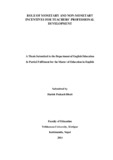Please use this identifier to cite or link to this item:
https://elibrary.tucl.edu.np/handle/123456789/1903| Title: | Role of Monetary and Non-Monetaryincentives for Teachers` Professional Development |
| Authors: | Bhatt, Harish Prakash |
| Keywords: | Work motivation;Profession;Nonmonetary incentives |
| Issue Date: | 2014 |
| Publisher: | Faculty of Education |
| Abstract: | This study entitled “Role of Monetary and Non-monetary Incentives forTeachersProfessional Development” aims toinvestigatethe role of monetaryand non-monetary incentives for teachers’ professional development.Motivation is crucial factor for teachers’ professional development. Monetaryand non-monetary incentives playimportantroleto increase motivation. Toexamine the role of monetary and non monetary incentivesit is important tounderstand theirinfluenceonteachers'professional development.So,this studytries tofind outthe influence ofthose incentives on teachers'professionaldevelopment.To carry out this study, forty English language teachers werepurposivelyselected from the different higher secondary schools of Kathmanduvalley. In this study, primary sources of data were used. The data werecollectedwith thehelp of questionnaire.Samples were purposively selectedfrom thespecifiedpopulation.The collected data were analyzed descriptivelyusing sample statistical tools. It was seenthat professional development isprimarily influenced and determined by monetary incentives. It was found thatteachersseek good salary for economic stability and future security. Aftergaining stability,they seek for promotion, power, job security andabroadstudy. On the other hand, non-monetary incentives were found to be equallyimportant for their professional growth.Without non-monetary incentives,monetary incentives become ineffective.Theyreceivedvery low salary whichis not sufficient to meet expenses. They are getting very low salary incomparison to other countries.Monetary incentives are found as the primarydeterminator whereas non-monetary incentives play the role of facilitator forprofessional development. It was found that they are inter-connected andbecome ineffective in isolation. This thesis consists of five chapters. The first chapter deals with theintroduction of the topic in which background, objectives, statement ofproblem, rationale of the study, research questions, significance of the study,delimitation and definition of important terms are included. The second chapter vii includes review of both theoretical and empirical literature, review along withthe implication of the review for the study.It also includes conceptualframework.The third chapter deals with the methods and procedures of thestudy.It includes research design, population and sample, sampling procedure,data collection tools, data collection procedure and data interpretationprocedures.The fourth chapter includes results and discussion of the data.Thediscussion is categorized into results and discussion. The fifthchaptersummarizes and concludes the result and findings. Moreover this chaptersuggests some pedagogical implications based on policy level, practice leveland further study. Reference and appendices are included in the final part of thereport. |
| URI: | http://elibrary.tucl.edu.np/handle/123456789/1903 |
| Appears in Collections: | English Language Education |
Files in This Item:
| File | Description | Size | Format | |
|---|---|---|---|---|
| THESIS.pdf | 216.37 kB | Adobe PDF |  View/Open |
Items in DSpace are protected by copyright, with all rights reserved, unless otherwise indicated.
